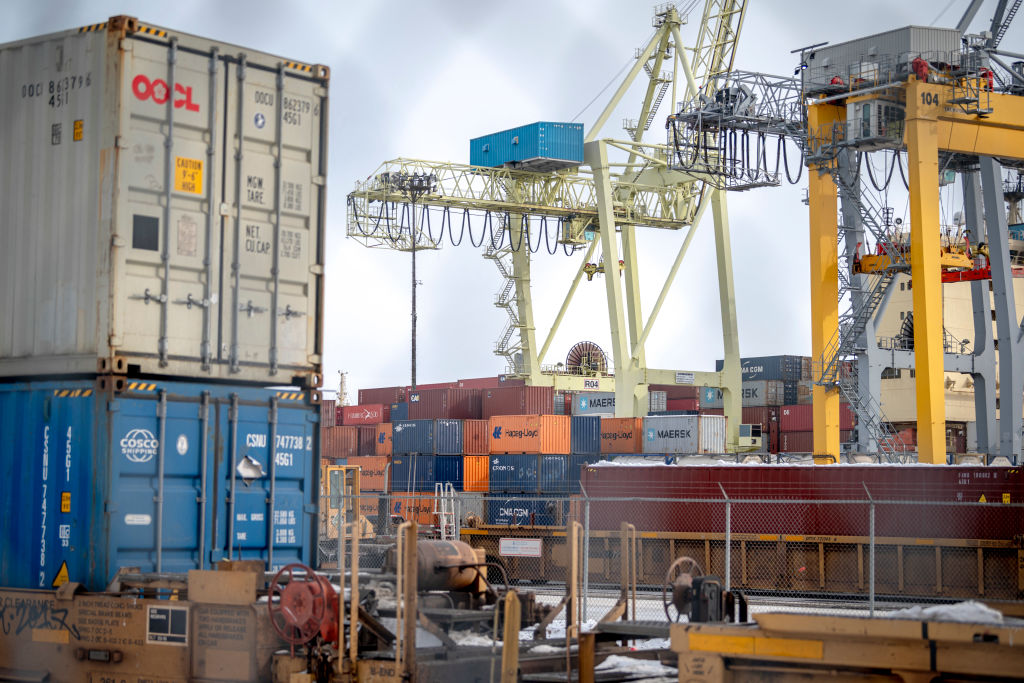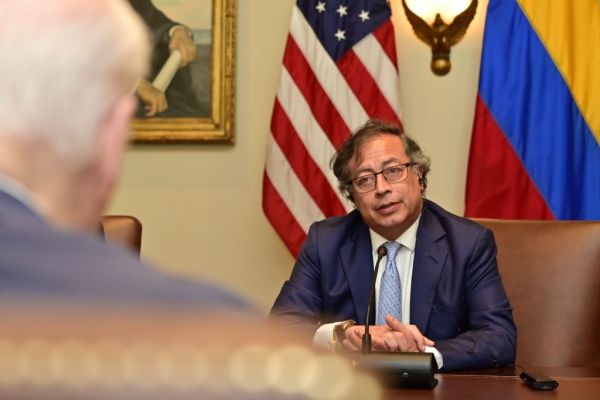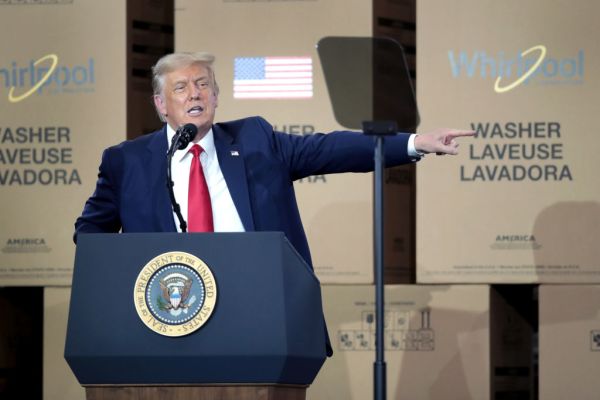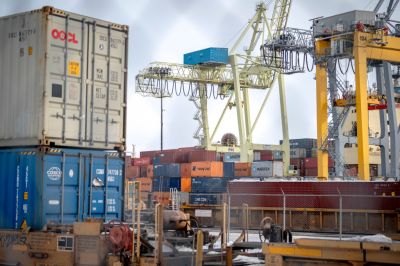Happy Monday! The country is bracing for six more weeks of winter after Punxsutawney Phil—who recently became a father—saw his shadow at Gobbler’s Knob on Sunday morning.
But despair not: A recent study using data from the National Centers for Environmental Information found that the weather-predicting woodchuck has a dismal accuracy rating of just 35 percent. If you want to truly know what’s up, Staten Island Chuck’s predictions have been 85 percent accurate over the years.
Quick Hits: Today’s Top Stories
- President Donald Trump on Saturday finalized tariffs, set to go into effect on Tuesday, at 10 percent on all Chinese goods, 10 percent on all Canadian energy imports, and 25 percent on all other Canadian imports and imports from Mexico, citing unresolved concerns over illegal immigration and cross-border fentanyl trafficking. The move sets up a likely trade war, with retaliatory tariffs promised from all three countries, and threatens to upset complex supply chains of a multitude of companies that rely on international trade. On Saturday, Canadian Prime Minister Justin Trudeau announced 25 percent tariffs on more than $105 billion of U.S. goods, targeting many products from Republican-leaning states—and the provinces of Ontario and British Columbia moved to block sales of U.S. wine, spirits, and seltzers. Mexican President Claudia Sheinbaum’s retaliatory plan is expected to be announced on Monday, and reportedly aims to target goods from Republican states. Both countries have pledged to coordinate their countermeasure policy.
- Israel on Saturday welcomed home three male hostages—Yarden Bibas, Ofer Calderon, and American-Israeli Keith Siegel—from terrorist captivity after 484 days in the Gaza Strip. Also on Saturday, Israel freed 183 Palestinian prisoners, including 18 serving life sentences. The exchange is part of the first phase of a three-part ceasefire deal between Israel and Hamas, in which the terrorist group has agreed to release at least 33 of the 97 remaining hostages in exchange for more than 1,500 Palestinian prisoners. Also as part of the first phase of the ceasefire deal, a border crossing between Egypt and Gaza was opened to sick and wounded Palestinians. Negotiations on the second phase are set to begin in two days.
- The U.S. military conducted airstrikes against the Islamic State in northern Somalia on Saturday. “Our initial assessment is that multiple operatives were killed in the airstrikes and no civilians were harmed,” Secretary of Defense Pete Hegseth said in a statement. “This action further degrades ISIS’s ability to plot and conduct terrorist attacks threatening U.S. citizens, our partners, and innocent civilians.”
- The Rapid Support Forces, a paramilitary group engaged in a civil war against the government for control of Sudan, attacked a market on Saturday in the city of Omdurman, killing 54 and injuring at least 158, according to the Sudanese Health Ministry. The shelling, part of a campaign by the Sudanese military to regain complete control of Omdurman, reportedly killed many women and children, and is the latest atrocity in a war that has left 28,000 dead, created hundreds of thousands of refugees, and induced widespread famines.
- The Food and Drug Administration on Friday approved Journavx, the first non-opioid painkiller backed by the agency in more than two decades. The drug, which uses the analgesic suzetrigine, is produced by the company Vertex and relies on a novel mechanism that targets nerves outside the brain, making it far less addictive than opioids. “Today’s approval is an important public health milestone in acute pain management,” Jacqueline Corrigan-Curay, J.D., M.D., acting director of the FDA’s Center for Drug Evaluation and Research, said in a statement.
- Homeland Security Secretary Kristi Noem announced Sunday in an internal DHS memo that roughly 350,000 Venezuelans currently living in the United States will lose temporary protected status, as the “extraordinary and temporary” conditions in their home country that have allowed them to reside in the United States “no longer” exist. The decision follows the reversal last week of a Biden administration extension of temporary protected status through 2026, which had originally been granted during the first Trump administration. Another 250,000 Venezuelans will still retain protection through September.
- Brian Driscoll, the acting director of the FBI, on Friday refused to implement a Justice Department order that he assist in firing agents involved in the cases related to the January 6, 2021, riot at the U.S. Capitol by turning over a list of their names, as eight executives were, according to Driscoll, forced out. The development came after the Trump Justice Department fired roughly 25 federal prosecutors involved in trying January 6 cases. Thousands of FBI employees are reportedly also being sent a questionnaire inquiring about their involvement in January 6 investigations.
- Secretary of State Marco Rubio plans to appoint Darren Beattie to serve as acting undersecretary of state for public diplomacy, Semafor first reported on Sunday. The controversial former speechwriter in the first Trump administration made a series of Twitter posts on January 6, 2021, telling his perceived political rivals—including Republican Sen. Tim Scott, historian Ibram X. Kendi, and the Black Lives Matter movement—to “take a knee to MAGA,” but has since claimed the Capitol Hill riots were an “FBI setup” to frame President Trump and his supporters. Beattie, who was fired from the White House speechwriting team in 2018 after news broke that he had attended a conference with white nationalists, could assume the high-profile State Department role as soon as today.
- Ken Martin, the leader of Minnesota’s state Democratic Party, won Saturday’s election to serve as chairman of the Democratic National Committee. Martin was considered the favorite to assume the position, easily defeating Wisconsin Democratic Party chairman Ben Wikler due in part to his organizational experience and party relationships. “This is a new DNC,” Martin told reporters. “I’ve always viewed my role as a chair of the Democratic Party to take the low road, so my candidates and elected officials can take the high road, meaning, I’m going to throw a punch.” Martin is tasked with resetting the national strategy of a party that is out of power in all three branches of government and more unpopular nationwide than it’s been in about 20 years.
- More information emerged over the weekend about the Wednesday midair collision of American Airlines Flight 5432 with an Army Blackhawk helicopter near Ronald Reagan International Airport, which killed all 67 people aboard the two aircraft. Publicly available data reviewed by news outlets indicated that the passenger jet was flying at a height of 357 feet before the incident and that the helicopter was not cleared to fly more than 200 feet above the ground. Additionally, National Transportation Safety Board investigators revealed during a Saturday briefing that the jet tried to abruptly turn upward just before the crash, and that, according to preliminary data that still needs to be verified, the radar scope being used by air traffic controllers at the time of the crash showed the helicopter at 200 feet off of the ground, a seemingly incorrect reading.
- A medical transport plane flying from Philadelphia to Springfield, Missouri, crashed in northeast Philadelphia on Friday night, killing all six passengers on board—all Mexican nationals—and one person on the ground, as well as injuring at least 22. The plane, a Learjet 55 operated by Jet Rescue Air Ambulance, had been returning a pediatric patient from Shriner’s Medical Hospital in Philadelphia to Mexico with her mother, with a refueling stop in Missouri. Philadelphia city officials said that flight logs showed the plane was in the air for less than a minute before crashing near a shopping mall.
- The Palisades and Eaton fires, the two largest conflagrations in the wave of wildfires that struck southern California last month, reached 100 percent containment on Friday according to state officials. Evacuation orders had already been lifted, and the fires had largely stopped spreading, but the benchmark marks the point at which fire crews say they have created a secure perimeter around the fire zone. The total number of buildings destroyed stands at over 16,000, with at least 29 people confirmed dead, and hundreds of thousands forced to evacuate over the last month. At least 14 people are still missing.
- Beyoncé won album of the year at the 67th annual Grammy Awards on Sunday for Cowboy Carter, her country-hip-hop crossover effort, beating out pop heavyweights Taylor Swift, Chappell Roan, and Sabrina Carpenter. Roan took home the best new artist award for her hit dance-pop album, The Rise and Fall of a Midwest Princess, and Kendrick Lamar won song of the year for “Not Like Us,” his diss-track takedown of fellow rapper Drake.
A Trade War This Way Comes

Ahead of a home game against the Detroit Red Wings on Sunday, Vancouver Canucks hockey fans drowned out a performance of “The Star-Spangled Banner” with boos. It seems that even the hospitality of our stereotypically polite neighbors to the north has its limits, and in this case, that limit is the imposition of a costly trade war with the United States.
On Saturday, President Donald Trump signed three executive orders following through on his threat to impose tariffs on the country’s three largest economic partners: Canada, Mexico, and China. Economists warn the duties, which are set to take effect at 12:01 a.m. ET on Tuesday, could raise prices, slow growth, and provoke retaliatory action at a critical moment. And it may be just the start of Trump’s efforts to upend longtime U.S. trade policy.
Trump, a self-proclaimed “tariff man,” has long vowed to punish Beijing for its unfair trade practices, and Saturday’s announcement—which included a 10 percent duty on all Chinese goods—represented a significantly pared-down version of his campaign threat of a 60 percent blanket tariff against China. The more severe measures were reserved not for America’s foremost global competitor but for its regional partners. With the exception of a partial carve-out for Canadian energy products, all goods entering the U.S. from Canada and Mexico will soon be subject to a 25 percent tariff—an effective overhaul of the highly integrated North American supply chain.
Each of the moves is ostensibly aimed at strong-arming the affected countries into stemming the flow of fentanyl and illegal immigration into the U.S., though plenty of analysts have expressed skepticism that tariffs are the right tool to achieve that stated aim. But that framing allowed Trump to invoke the International Emergency Economic Powers Act, which, together with his national emergency declarations, could give the president sweeping powers to set U.S. tariff policy—an authority that lies solely with Congress under Article I but was parceled off to the executive branch throughout the 20th century.
Nor are economists convinced that the measures can achieve their other goal of correcting trade imbalances—or that trade imbalances are even a meaningful indicator of the overall health of American commerce. “Economists don’t think that bilateral trade deficits are a good metric for almost anything. For example, you might have a bilateral trade deficit with your local grocery store. If you impose a tariff on your grocery consumptions, you’re just going to shift your consumption to a different grocery store,” Felix Tintelnot, an associate professor of economics at Duke University, told TMD. “The U.S. has been accumulating a lot of debt, in particular government debt, and if that doesn’t change, we can’t … expect the trade deficit to shrink.”
Tariffs have generally been used sparingly by the U.S. in recent decades, but their proponents argue that they can help protect American firms from overseas competitors, encourage companies to move their production stateside, and raise revenue for the federal government. A protectionist trade policy can also serve national security ends. During his first term, Trump imposed tariffs against China in an effort to break American dependence on Chinese manufacturing, among other motives.
But the blanket levies against other U.S. partners complicate that goal this time around. “It is conceivable that, as we have seen from 2018 and 2019, this could indeed lead to some relocation of sourcing outside China,” Tintelnot said. “Mexico would have been a prominent alternative production location—lower labor costs and closer to the U.S.—but by simultaneously putting tariffs on Mexico, we are actually making it harder to achieve the goal of decreasing dependence on China.”
American companies and consumers could feel the pain of the sweeping new measures, and soon. Tariffs are paid by U.S. importers, not foreign companies, and that fee is in turn generally passed on to American consumers. Stock futures tumbled on the news on Sunday night—as of 5 a.m. ET, Dow and S&P 500 futures had dropped roughly 1.5 percent, while futures for the Nasdaq Composite had plummeted nearly 2 percent.
For non-durable goods like fruits and vegetables—both major U.S. imports from Mexico—the price increases could hit relatively quickly, and even instantly if companies preemptively brace for the effects of the tariffs. For durable goods like appliances, it could take months for the disruptions to reach American buyers, given that industries had time to brace their supply lines for the measures. But if Trump sticks with the tariffs for the long term, the effects could be dramatic. ING, the Dutch financial services firm, estimated that, if fully implemented, the levies could increase costs for individual American consumers by up to $2,400 per year. Meanwhile, Capital Economics assessed that the tariffs could push inflation as high as 4 percent, to mid-2023 levels.
Which U.S. industries should expect to be hit the hardest? American automakers are the real losers of the day, with billions of dollars in cars and car components passing over the Mexican and Canadian borders each week. Nearly 40 percent of vehicles manufactured by General Motors—the largest U.S. automaker—are made in factories in Canada and Mexico. “The U.S. car sector is highly integrated with Canada and Mexico,” Tintelnot said. “It’s common for a component to cross the border multiple times in the process of eventually making itself into the final assembly of the car, so I think we’re going to see big disruptions in the vehicle sector.”
And the threat of retaliatory action by Canada, Mexico, and China stands to worsen an already bad situation. On Saturday night, Canadian Prime Minister Justin Trudeau announced plans to impose more than $100 billion in tariffs on a range of American goods, including alcohol, household appliances, lumber, and plastics. The first levies will take effect on Tuesday, at the same time as the American measures, and the next phase will be implemented three weeks later to give Canadian businesses time to prepare.
More than $2.5 billion in commerce transits the U.S.-Canadian border every day, threatening to throw the country into a recession as it grapples with political upheaval in the wake of Trudeau’s announced resignation last month. “This is a choice that, yes, will harm Canadians, but beyond that, it will have real consequences for you, the American people,” Trudeau said, addressing Americans directly. “As I have consistently said, tariffs against Canada will put your jobs at risk, potentially shutting down American auto assembly plants and other manufacturing facilities.”
Mexican President Claudia Sheinbaum, meanwhile, has said she will unveil the country’s counter-tariffs against the U.S. later today, calling retaliation a regrettable “Plan B.” China’s response was notably more muted, but a foreign ministry spokesperson indicated plans on Sunday to bring the case to the World Trade Organization—a largely symbolic move—and said Beijing would take “necessary countermeasures” without elaborating further.
If Trump’s public statements are any indication, this weekend’s maneuvers could be the start of a broader protectionist pivot by the new administration. Speaking from the Oval Office on Friday, Trump said that he would “absolutely” impose tariffs on the European Union next. The president has also floated the possibility of duties on all goods imported into the country—a move that, as The Dispatch’s Scott Lincicome pointed out at the time—would be sure to face congressional pushback and legal challenges.
“This is a no-win situation. Nobody wins a trade war,” Peter Simon, an economics professor at Northeastern University, told TMD. “This beggar-thy-neighbor approach that Trump seems to be endorsing is not going to work.”
Worth Your Time
- The Economist reported on the departure of French troops from their anti-terrorism posts in West Africa, and with them, the region’s sense of stability and security amid a resurgent jihadist threat and incompetent junta rule. “In Mali the army, supported by mercenaries from Russia’s Wagner Group and Bayraktar drones from Turkey, made some important territorial gains in the country’s north. In 2023 it seized Kidal, the symbolically significant stronghold of Tuareg separatists that French troops had restrained Malian forces from entering a decade earlier. But it has failed to stop the entrenchment of Islamic State in the north, or to stem worsening violence elsewhere in the country. Urban areas long considered secure have recently seen attacks,” the article reads. “Elsewhere in the region, things are hardly better. A month after the attack in Bamako JNIM claimed responsibility for an attack on a military checkpoint on the outskirts of Niamey, Niger’s capital. In Burkina Faso, the national army now controls barely a third of the country’s territory.”
- In Open Vallejo, a local news site in Vallejo, California, Anna Bauman and Matthew Brown told the strange-but-true story of a vegan, AI death cult linked to the murder of a border patrol agent in Vermont last month. “Maximilian Snyder, a 22-year-old data scientist arrested in Northern California on Friday on suspicion of murder, and Teresa Youngblut, the 21-year-old computer science student charged last week in connection with the shooting death of U.S. Border Patrol Agent David Maland, appear to follow a fringe, self-described ‘vegan Sith’ ideology that started in the Bay Area and has connections to violence, according to police records, an interview with a person familiar with the group, and years of social media and blog posts reviewed by Open Vallejo,” they wrote. “[Jessica] Taylor said the group believes in timeless decision theory, a Rationalist belief suggesting that human decisions and their effects are mathematically quantifiable. The Zizians also apparently believe that because there are two hemispheres in the brain, individuals can split their consciousness between two personalities by waking one side at a time, Taylor said. She said veganism and animal rights are also central to the ideology. A bio for an Instagram account that appears to belong to Youngblut reads, ‘talk to me about being vegan and ai alignment.’”
Presented Without Comment
Axios: The Humble Penny Meets a Formidable Match: Elon Musk
The penny is seemingly immortal: Thousands of people have tried to kill it, but every time it has survived.
…
A post from the official DOGE account on X makes clear what everybody who has studied the subject already knows—that pennies are, quite literally, weighing down the American economy.
Also Presented Without Comment
CNN: U.S. Government Agencies Order Employees to Remove Gender Pronouns from Email Signatures
Also Also Presented Without Comment
Axios: Boston University Closes Antiracist Research Center as Ibram X. Kendi Leaves
In the Zeitgeist
Luka Dončić, the Dallas Mavericks star and possibly the best player in the NBA, was traded this weekend to the Los Angeles Lakers for Anthony Davis, who is very good in his own right but definitely not the best player in the NBA. The Dispatch’s representative from Dallas, Victoria Holmes, probably had a similar reaction to Phoenix Suns’ superstar Kevin Durant when she saw the news.
Toeing the Company Line
- The Dispatch is hiring! If you’re someone who likes what we’re doing and wants to join the team, we’re looking to bring aboard a chief of staff, visual editor, and commercial partnerships manager. And if you’re a college student—or know one who might be interested—a reminder that our 2025 summer internship listing is live, too!
- The skiff’s newest addition, ideas editor Valerie Pavilonis, is taking member questions for this month’s Dispatch Monthly Mailbag (🔒). If you want to know why she joined The Dispatch from the New York Times or how she plans to tackle our cultural coverage (or if you just want to welcome her aboard!), members can drop a question in the comments section here.
- In the newsletters: Jonah Goldberg wrote about the latest round of Cabinet nominees and the declining trust in American institutions, Nick Catoggio condemned Donald Trump’s response to last week’s plane crash in Washington, D.C., and Bonnie Kristian explored the Bible’s lessons in good authority for the latest Dispatch Faith.
- On the podcasts: Sarah Isgur, Steve Hayes, David French, and Mike Warren discussed last week’s confirmation hearings on The Dispatch Podcast roundtable, Jonah ruminated on Trump’s tariff threats, and Michael Reneau interviewed Mark Seitz and Matthew Soerens in an unlocked edition of the Dispatch Faith podcast. On today’s episode of The Dispatch Podcast, Jamie Weinstein talks to Michael Singh about the future of Iran policy.
- On the site over the weekend: Jennifer Brick Murtazashvili reflected on Mustafa Akyol’s book The Islamic Moses, Tal Fortgang contemplated the relationship between big government and big business, and Eric Johnson reviewed Rebecca Winthrop and Jenny Anderson’s new book on adolescent education, The Disengaged Teen.
- On the site today: Zack Cooper pens a Monday Essay on what Trump 2.0 might mean for the future of Taiwan, and Annalise DeVries explains the current crisis in the Democratic Republic of Congo.
Let Us Know
Do you think tariffs are the right stick to get America’s trade partners to crack down on illegal immigration and fentanyl trafficking?









Please note that we at The Dispatch hold ourselves, our work, and our commenters to a higher standard than other places on the internet. We welcome comments that foster genuine debate or discussion—including comments critical of us or our work—but responses that include ad hominem attacks on fellow Dispatch members or are intended to stoke fear and anger may be moderated.
With your membership, you only have the ability to comment on The Morning Dispatch articles. Consider upgrading to join the conversation everywhere.